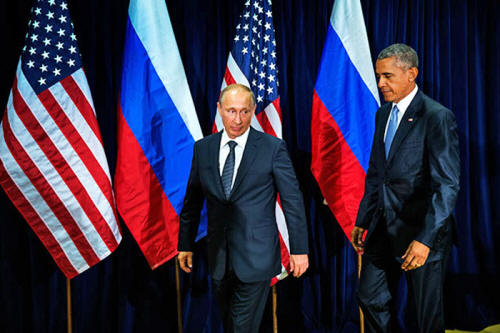|
31 October 2016
with Russian President Vladimir Putin on the opening day of the United Nations General Assembly, on September 28, 2015. (Photo: Doug Mills / The New York Times)
His decisions have led to numerous civilian casualties and the threatening of nuclear confrontation with his nation's ideological foe.
Domestically, his administration has jailed journalists and silenced critics in government, and since WWII, his country's intelligence services have meddled in the elections of dozens of countries and are now contemplating a cyberattack on its hegemonic rival.
His administration maintains alliances with corrupt juntas and religious fundamentalists while championing domestic and foreign policies that have done little to,
His name is Barack Obama...
One could certainly be forgiven in thinking it was Vladimir Putin, since his justifications for Russian policy are strikingly similar.
While the U.S. corporate media frantically reports on Russia's actions in Ukraine and Syria, it appears content with the havoc wreaked by its Nobel Peace Prize president in sundry countries across three continents.
For well-established reasons rooted in 'exceptionalism' and indoctrination, the U.S. mainstream media cannot refer to Obama and his administration in the same terms used to describe Putin.
Whereas The New Yorker can run a headline that states, "Putin, Syria, and Why Moscow has Gone War Crazy," it is unfathomable to think of the U.S. press referring to the Obama administration's policies in similar language.
In fact, the article's author, Joshua Jaffe, appears bewildered with Russia's policies in the Middle East and Europe, especially the Russian Defence Ministry's announcement on October 8 that it had deployed nuclear warheads to Kaliningrad.
The fact that Kaliningrad is part of Russia aside, Jaffe writes that,
If this Russian move is irrational, wouldn't Obama's actions - supporting ill-defined rebel groups in Syria, signature strikes in Pakistan and indiscriminate Saudi bombing in Yemen - be irrational as well?
And in any state where the press was doing its job, wouldn't a look at U.S. nuclear policy - by sheer quantity of warheads, one that could be categorized as "readiness to blow up the world" - and its citizens' attitudes toward weapons of mass destruction be prudent?
It is unlikely that such a critical look will come anytime soon from the submissive U.S. mainstream media, however.
Though much has been written about Putin's clampdown and control of the Russian press, corporate U.S. media outlets are hamstrung by the monopoly that six corporations have on the American "marketplace of ideas."
This is not to exonerate or extoll Putin. On the contrary, Putin is an opportunist bent on increasing his power and influence.
But so is Obama and any other (future) U.S. president, be it Donald Trump or Hillary Clinton.
One can only dream that the same measures that the U.S. press takes in detailing Russian atrocities in Syria could be applied to U.S. atrocities there, and also in,
But the U.S. corporate media and populace seem to believe that Russia's intentions are malicious, while the United States' intentions are benevolent.
This why U.S. bombings of civilians in Syria are described as "mistakes," whereas the aim of Russian bombing can only be "terror."
For example, the bombing of a UN convoy in September that Russia says was accompanied by terrorist elements was reported in the U.S. press as a targeted strike against civilians.
Russia may very well target civilians. The tragedy of Aleppo is well-documented.
The point here is not to justify Russian actions. It is to question why the U.S. mainstream media accept the Obama administration's assertions that Russia's bombs are aimed at civilians, while U.S. bombs are not.
One could argue that both Russia and the U.S. are guilty of civilian bombings, since distinctions between rebel, terrorist and civilian are blurred in civil war.
But this would challenge the notion of benevolent intentions that are at the core of American exceptionalism.
Interestingly, those who have bothered to look into Obama's abovementioned signature strikes will find that tolerance of civilian casualties is at the heart of that policy. And if a Martian - bereft of any understanding of nationalism or exceptionalism, but well-versed in international Human Rights Law - were to take a cursory look at the last 50 years of U.S. foreign policy, he might conclude that the U.S. does, in fact, target civilians.
A cynic would claim that the truth here does not matter. It is what people believe to be the truth that reigns supreme. To this end, both the American and Russian mainstream media and governments are presenting a one-sided version of atrocities that aims to vilify the other.
To address this dangerous trend, I presented a paper at Penza University in southern Russia on October 12, examining the language the Western media use to castigate and dehumanize Putin.
The paper, "Language as a Weapon - How Western Journalists Portray Russian Policy," was given at a conference titled, "Language. Law. Society."
After completing my talk, I fielded a question from a Russian academic regarding the role of the U.S. as a world police force. This is a common question in the former Soviet Union and is trumpeted in the Russian press. My answer was that the U.S. would never be a world police force, as it intervenes only in those areas where its vital economic interests are at stake.
The main point being that the U.S. corporate media do not accurately describe these interventions as power moves that waste large amounts of civilian life.
Instead, the corporate media too often act as a public relations firm for the U.S. government, repeating hollow rhetoric about freedom, liberty, democracy and the open market.
The man responded that I should move to Russia, since the Russian press also make similar hollow claims in support of Putin. Nobody would argue that Putin does not control the Russian media, and that his distorted version of the truth prevails.
But one should question why, in a "free" society like the U.S., Obama's distorted version does, too...
|


